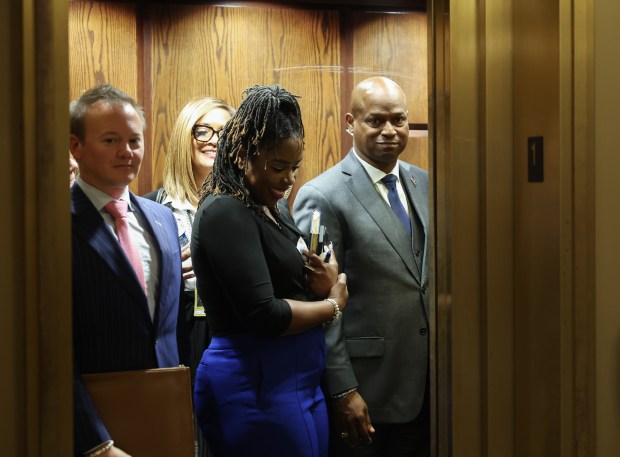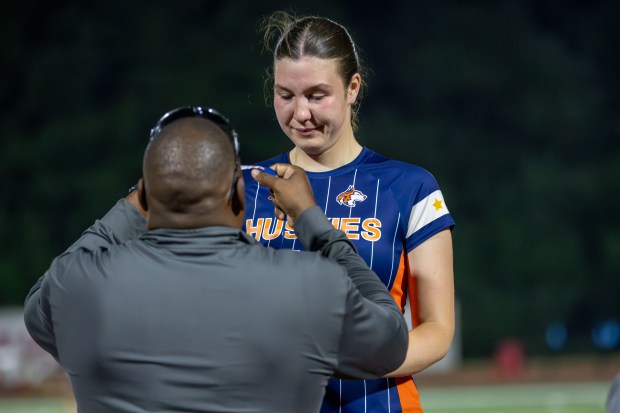Barry Lee Whelpley, the man charged with the 1972 sexual assault and murder of a 15-year-old Naperville girl, has died in the Will County jail while awaiting trial.
Whelpley, 79, was found unresponsive in his cell about 6:30 a.m. Friday, and efforts to revive him were unsuccessful, said Kathy Hoffmeyer, spokeswoman for the Will County Sheriff’s Office. An autopsy was to be conducted Saturday, but it’s believed he died of natural causes, she said.
“As far as I know, there were no signs that it was (anything but a natural death),” Hoffmeyer said. “It appears that he just died in his sleep.”
Julie Ann Hanson was sexually assaulted and stabbed to death in Naperville in July 1972. Police arrested Barry Lee Whelpley in 2021 and charged him with first-degree murder.
The death will be investigated by the Will/Grundy Major Crimes Task Force, as required by state law, she said. Whelpley was alone in the cell, and Hoffmeyer said she was not aware of any previous health problems.
Whelpley had been held at the jail since his June 2021 arrest at his Mounds View, Minnesota, home for the July 7, 1972, murder of Julie Ann Hanson, whose body was found in a cornfield a day after she was reported missing by her family. She had been stabbed 36 times, officials said.
Whelpley, a 1964 Naperville Community High School graduate, was 27 at the time Hanson was killed and lived less than a mile from the teen’s home, police said. However, he was not arrested until DNA evidence linked him to the case.
Since being taken into custody, Whelpley has been in court numerous times as his lawyers fought to suppress statements he made to police while they executed a warrant to search the suburban St. Paul home the retired welder shared with his wife before. Those comments were ruled to be inadmissable because he had not yet been arrested or read his Miranda rights but in a decision made earlier this past week, comments he made at a Minnesota police station following his arrest were allowed.
Until Whelpley was charged, the Hanson case was one of Naperville’s oldest unsolved murders and one that stayed on the radar for then-Police Chief Robert Marshall.
“This brutal crime haunted our community many, many, many years. It hit the community, very hard,” Marshall said at the news conference announcing the arrest. “This young girl, 15 years old, left her home in Naperville and never returned.”
Naperville was a much smaller town in 1972, with a population of about 23,000 people. Hanson was a high school girl who borrowed her 12-year-old brother’s bicycle to go for a ride and didn’t return home, her body found a day later abandoned in a ditch off 87th Street in what was then a rural farm area less than a mile east of Modaff Road in Will County.
The case remained unsolved until technological advancements in DNA and genetic genealogy allowed detectives to have private labs do sophisticated testing and genetic analysis on evidence collected in the case, police said in 2021.
One of the companies they worked with was Identifinders International in California. Company founder Colleen Fitzpatrick said at the time of Whelpley’s arrest that she initially spoke to Naperville police in 2019 about the case and eventually found a way to test the DNA they had, which had degraded.
The company uses a database in which users voluntarily upload their DNA for analysis and research. Fitzpatrick said. The database’s original purpose was for genealogy research but now it’s been expanded to help law enforcement solve cases, she said in 2021.
In the Whelpley case, Identifinders compared the DNA from the case to samples in their database and pulled up matches of what they call “DNA cousins,” or matches from distant relatives who may or may not even know Whelpley, she said.
From there, they used public records, obituaries, newspaper archives and other sources to build out family trees and eventually zone in on a main suspect, she said.
Naperville police also worked with the HudsonAlpha Lab in Huntsville, Alabama, a biotech company that provides genomic testing, analysis and interpretation.
Hanson’s parents and a brother died before Whelpley was charged with the murder, but two siblings were alive at the time of the arrest. They declined to be interviewed but issued a statement at the time saying they were thankful an arrest had finally been made.





